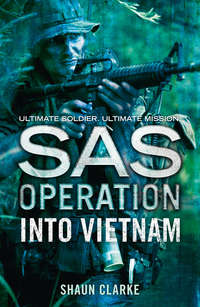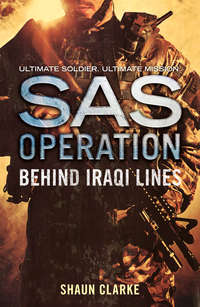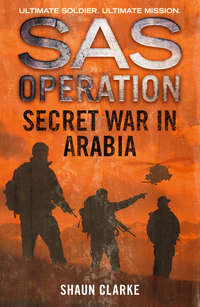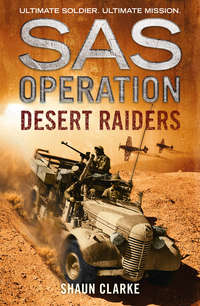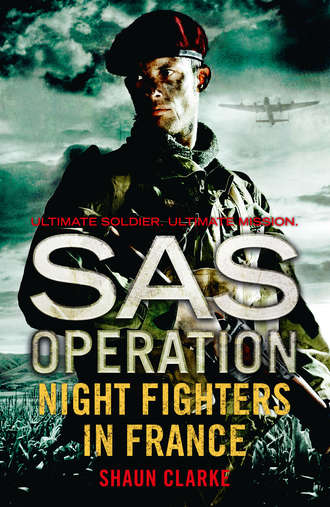
Полная версия
Night Fighters in France
‘French partisans,’ Captain Callaghan corrected him. ‘“Maquis” is a Corsican word meaning “scrub” or “bush”. The Maquis are so called because when the Krauts introduced compulsory labour in the occupied countries, many men fled their homes to live in rudimentary camps in the scrubland and forests. Since then, with the aid of our Special Operations Executive and America’s Office of Strategic Studies, they’ve been engaged in highly successful sabotage activities behind German lines. They may be Frogs to you, but they’re a bunch of tough, courageous Frogs, so don’t knock them.’
‘Sorry, boss,’ Neil mumbled.
‘Good or not, why do we need ’em?’ Rich Burgess asked.
‘Because we believe their local knowledge will make them invaluable for planning raids, particularly those behind enemy lines.’
‘Are they troublesome?’ Sergeant Bob Tappman asked.
Callaghan nodded. ‘Unfortunately, yes, and for a couple of reasons.’
‘Which are?’
‘The Maquis are split between those who support General de Gaulle’s Free French and those who sympathize with the communists. Unfortunately, the latter believe, as do the communists, that de Gaulle is no more than Britain and America’s stooge, to be used and then discarded.’
‘Bloody marvellous!’ Corporal Reg Seekings murmured, then asked: ‘Anything else?’
‘Yes,’ Callaghan said. ‘A lot of the Maquis have shown more interest in storing weapons for after the war, to use against de Gaulle’s supporters, than they’ve shown in actually killing Germans.’
‘Beautiful!’ Jacko said, laughing. ‘I can’t wait to work with them.’
‘Also,’ Callaghan pressed on, ‘the SOE views the Maquis as its own concern, has its own teams to arm and organize them, and therefore won’t take kindly to us becoming involved. In fact, they’ve already unofficially voiced their complaints about the plan to insert us in what they view as their own territory.’
‘Well, stuff the SOE!’ Rich exploded.
‘I agree,’ said Bob Tappman. ‘Those sods don’t know anything about the real world. We can deal with the Maquis better than they can, so let’s go in and get on with it.’
‘Nevertheless,’ Callaghan continued, ‘even given these negative points, we do believe that with the advent of D-Day and the continuing advance into Europe, the Maquis will be more co-operative than they’ve been in the past. They’ll want the war to end as soon as possible…’
‘So that they can get stuck into each other,’ Jacko interrupted, copping a laugh from the other men.
‘…to enable them to sort out their differences,’ Callaghan continued, ignoring the interjection. ‘We’re banking on that.’
‘And what if it doesn’t work out that way?’ Bob Tappman asked bluntly.
Callaghan nodded to Greaves, then stepped aside to let his fellow captain take centre stage. ‘Where we’re going,’ Greaves explained, ‘the situation is changing constantly, so our own position there will be highly unpredictable. Therefore we have to be ready to change our plans at a moment’s notice. What I’m about to outline to you is a preliminary course of action that’ll be subject to changing circumstances on the ground.’
‘I love surprises,’ said Jacko.
‘I should point out, first thing,’ Greaves continued, ‘that we won’t be alone. The Special Air Service Brigade, consisting of British, French and Belgian components, was flown into France shortly after D-Day and has since set up a wide network of bases in Brittany, the Châtillon Forest, east of Auxerre, the area around Poitiers and the Vosges. Some of these groups are working hand in glove with the Maquis; others are out there on their own. Either way, they were inserted in order to recce the areas, receive stores, and engage in active operations only after our arrival.’
‘So when and where do we arrive?’ Bob Tappman asked.
In response, Greaves picked up a pointer and tugged the canvas covering off the blackboard, to reveal a map drawn in white chalk and showing the area of central France bounded by Orléans to the west, Vesoul to the east, Paris to the north and Dijon to the south. ‘We’ll parachute in here,’ he said, tapping a marked area between Rennes and Orléans, ‘and then make our way by jeep through the forest paths north of Orléans. The vehicles will be dropped by parachute once you men have landed. They’re modified American Willys jeeps equipped, as they were in North Africa, with twin Vickers K guns front and rear, supplemented with 0.5-inch Browning heavy machine-guns. The modified versions have a top speed of approximately 60mph and a range of 280 miles, though this can be extended by adding extra fuel tanks, so you should get anywhere you want to go with a minimum of problems.’
‘And where do we want to go?’ Jacko asked.
‘With the recent American breakthrough at Avranches, we’ve been presented with a fluid front through which small vehicles can pass. The American Advance Party already has one troop spread across a direct line from Normandy to Belfort, roughly across the centre of France. With those men already in place, and with ensured air supply for our columns, we’re in a good position to cause chaos behind the Germans who’re withdrawing in front of the US 3rd Army led by General Patton. Therefore, in order to lend support to Patton’s advance and help his 3rd Army reach Dijon, you men will head initially for the Châtillon Forest and, once there, make contact with the Maquis. You will then learn everything you can about the area from the Maquis and, using that knowledge, embark on a series of hit-and-run raids, preferably by night, against enemy positions.’
‘How far do we take the raids, boss?’ Bob Tappman asked in his customary thoughtful manner.
‘Nothing too daring, Sergeant,’ Greaves replied. ‘Nothing too risky. The point is to harass them – not engage in unnecessary or lengthy fire-fights – and to sabotage their channels of communication and, where possible, destroy their transport. The task is harassment and distraction, rather than elimination – so just get in and out as quickly as possible. And no heroics, please.’
‘You won’t get any heroics from us, boss,’ Jacko said, lying for all of them. ‘No one here wants a bullet up his arse if he can possibly avoid it. We all want to live to a ripe old age.’
In fact, Jacko was not alone in thinking that the last good time he had had was a month ago, when on a weekend pass to London. After the peace and quiet of Gloucestershire, he and the other Originals had been thrilled to find the West End so lively, with staff cars and troop carriers rumbling up and down the streets, Allied bombers constantly roaring overhead, protected by Spitfires and other fighter planes, flying to and from France; the pavements thronged with men and women in the uniforms of many nations; the parks, though surrounded by anti-aircraft guns, packed with picnicking servicemen and civilians; ARP wardens inspecting the ruins of bombed buildings while firemen put out the latest fires; and pubs, cafés, cinemas and theatres, albeit with black-out curtains across the windows and their doorways protected behind sandbags, packed with people bent on enjoying themselves.
Even during the night, when diminishing numbers of German bombers flew over to pound London and V-l and V-2 flying bombs caused further devastation, the city was packed with soldiers, pilots, sailors and their women, all having a good time despite the wailing air-raid sirens, exploding bombs, whining doodlebugs, blazing buildings and racing ambulances. Compared with tranquil Gloucestershire, the capital was a hive of romance and excitement, for all the horrors of war. In truth, it was where most of the Originals wanted to be – either on leave in London or taking part in the liberation of Europe. The latter was, at least, now happening and they would soon be part of it. That made Jacko, and most of the others, feel much better. They were back in business at last.
‘What’s the transport situation?’ Sergeant Pat Riley asked.
‘Handley-Page Halifax heavy bombers specially modified to carry men and supplies and drop jeeps and trailers from its bomb bay,’ said Greaves.
‘Bloody sitting ducks,’ Neil Moffatt whispered to his mate, Harry ‘Harry-boy’ Turnball.
‘Not any more,’ the captain said to Neil, having overheard his whispered remark. ‘In fact, the Halifaxes are now armed with two .303-inch Browning machine-guns in the nose turret, four in the tail turret, and two in manual beam positions, so we should have adequate protection should we be attacked by enemy fighters during the flight.’
‘Thanks, boss, for that reassurance,’ Neil said wryly.
‘Is it true, as some of us have heard, that we’re having problems in getting enough aircraft?’ Rich Burgess asked.
‘Unfortunately, yes. Because we don’t yet have our own planes, all arrangements for aerial transport have to be co-ordinated by 1st Airborne Corps and 38 Group RAF at Netheravon and Special Forces HQ. This means that we practically have to bid for aircraft and we don’t always get enough for our requirements. For this reason, you should expect to be inserted in batches over two or three successive nights; likewise for the jeeps.’
‘Which means that those who go earliest have the longest, most dangerous wait on the ground,’ Rich said. ‘More sitting ducks, in fact.’
‘Correct,’ Greaves replied with a grin. ‘Which means in turn that the most experienced men – including you, Corporal – will be in the first aircraft off the ground.’
‘Gee, thanks, boss,’ Jacko said, imitating an American accent with no great deal of skill.
‘Do we take off from Netheravon?’ Bob Tappman asked.
‘No. From RAF Station 1090, Down Ampney, not far from here. Station 1090 will also be giving us support throughout our period in France.’
‘So when do we get out of here,’ Rich asked, ‘and get to where it’s all happening?’
Greaves simply glanced enquiringly at the CO, Captain Callaghan, who stepped forward to say: ‘Tomorrow night. You’ll be kitted out in the morning, collect and manually test your weapons throughout the afternoon, and embark at 2250 hours, to insert in central France just before midnight. Any final questions?’
As the response was no more than a lot of shaking heads, Callaghan wrapped up the briefing and sent the men back to their barracks with instructions to pack as much as they could before lights out. They needed no encouragement.
2
Next morning the men rolled off their steel-framed beds at first light, raced to the toilets, then had a speedy cold shower and shaved. Cleaned and jolted awake by the icy water, they dressed in Denison smock, dispatch rider’s breeches and tough motor-cycle boots. The smock’s 1937-pattern webbing pouches held a compass and ammunition for the .455-inch Webley pistol, which was holstered at the hip. Though most of the newer men wore the paratrooper’s maroon beret with the SAS’s winged-dagger badge, as ordered by a directive of the airborne forces, of which they were presently considered part, the Originals viewed the directive as an insult and were still defiantly wearing their old beige berets.
Once dressed, they ‘blacked up’ their faces and hands with burnt cork, which they would keep on all day and at least throughout the first night in France. They then left the barracks and crossed the parade ground to the mess hall at the far side, most glancing up just before entering the building to see the many Fortresses, Liberators and escorting Spitfires flying overhead on their way to France for the first of the day’s bombing runs. In the mess, which was filled with long, crowded tables, steam, cigarette smoke and a lot of noisy conversation, they had a substantial breakfast of cereal, bacon, fried eggs and baked beans, with buttered toast or fried bread, and hot tea.
‘The last day we’re going to get decent grub for a long time,’ Jacko said to the men at his table, ‘so enjoy it, lads. Only two more to go.’
They tucked in as best they could in the time allocated to them, which wasn’t much; then, with full bellies, they left the mess hall and walked briskly to the armoury, where they collected their personal and other weapons. These were, apart from the Webley pistol, which they already had, of a wide variety, most chosen by the individual for purely personal reasons and including 9mm Sten sub-machine-guns, Thompson M1 sub-machine-guns, more widely known as ‘tommy-guns’, and Bren light machine-guns. Their criss-crossed webbing was festooned with thirty and thirty-two-round box magazines, hand-grenades, a Fairburn Sykes commando knife, a bayonet, binoculars and some Lewes bombs – the latter invented by the late Lieutenant John ‘Jock’ Steel Lewes and first used in the North African desert in 1941.
Burdened down with their weapons, they scrambled into Bedford QL four-wheel-drive trucks and were driven to a firing range at the southern end of the camp. There, as the sun climbed in the sky and the summer heat grew ever stronger, they lay in the dirt and took turns at firing their various weapons, simultaneously practising their aim and checking that the weapons worked perfectly and did not jam. After a couple of hours, they stripped and cleaned the weapons, slung them over their shoulders, then clambered back into the trucks and were driven back to their barracks. There they deposited their weapons in the lockers by their beds before returning to the mess hall for lunch.
‘The second-to-last decent meal for a long time,’ Jacko reminded his mates, ‘so tuck in, lads.’
After lunch they were marched to the quartermaster’s store, where they picked up their bergen rucksacks, groundsheets, survival kit, including water bottles, first-aid box, tin mug and plates with eating utensils, and finally their Irvin X-Type parachute. Another hour and a half was spent packing the kit into the rucksacks and checking thoroughly that the chute was in working order, then they strapped the rucksacks, rolled groundsheets and parachute packs neatly to their backs, picked up their weapons and left the barracks like beasts of burden.
‘All right, you ugly mugs,’ Sergeant Lorrimer growled at the men, standing before them with his clenched fists on his broad hips, as bombers rumbled overhead on their way to France, ‘get in a proper line.’
After being lined up and inspected by their respected sergeant, who had an eagle eye and a sharp tongue when it came to error and inefficiency, they were marched to the waiting Bedford trucks, clambered up into them, and were driven out of the base and along country roads to Down Ampney and RAF Station 1090. On the way they passed columns of troop trucks heading away from many other staging areas and bound for various disembarkation points along the coast, where the boats would take them to France to join the Allied forces already there. Above, the cloudy sky was filled with Allied bombers and fighter escorts likewise bound for France. Such sights gave most of the men a surge of excitement that had been missing too long, and eased the bitter disappointment they had been feeling at missing D-Day.
‘Nice to know we’re joining them at last,’ Rich said to his mate Jacko. ‘We’ve been stuck here too long.’
‘Bloody right,’ Jacko replied, waving at the troops heading in the opposite direction in Bedfords. ‘And we’ll be there in no time.’
After passing through the heavily guarded main gates of the RAF station, they were driven straight to the airfield, which was lined with both British and American bombers, as well as the fighters that usually escorted them to Germany. Disembarking from the trucks at the edge of the airfield, near a modified Halifax bomber being prepared for flight and the Willys jeeps waiting to be loaded on to it, they were greeted by Captains Callaghan and Greaves.
‘How goes it, boss?’ Sergeant Lorrimer asked Callaghan.
‘Not too well,’ Greaves replied bluntly. ‘Captain Callaghan and I have wasted most of the day desperately phoning between 1st Airborne Corps and 38 Group RAF at Netheravon and Special Forces Unit, begging for more aircraft for the drop.’
‘Bloody waste of time,’ Callaghan said curtly to Sergeant Lorrimer and the other ranks grouped around him. ‘By the time we’d finished we still had only one Halifax to go with – this one here.’
‘Which means,’ Greaves cut in, ‘that we will, as feared, have to insert the men and jeeps over two or three nights.’
‘Wonderful!’ Lorrimer murmured sardonically. ‘What a bloody waste of time!’
Callaghan nodded wearily, then continued: ‘Since then, we’ve been rushing around trying to finalize routes, supplies and men, and liaise with the units across the water. Everything’s now set for the drop, but the insertion will necessarily be tedious. The most experienced men will therefore go first.’
‘That’s us,’ Jacko said.
‘Lucky us,’ Rich added. ‘We’ll be on the ground with Krauts all around us and we won’t be able to do a sodding thing until the others are dropped. Two or three days of high risk coupled with boredom – a fitting reward for experience.’
‘Stop whining,’ Lorrimer told him. ‘When it’s over you’ll be boasting about it in every pub in the land. You should thank us for this.’
‘Gee, thanks, Sarge!’ Rich replied.
‘All joking aside,’ Callaghan said, ‘this business of not having our own aircraft means we’re practically having to beg for planes that are constantly being allocated elsewhere at the last moment, leaving us strapped. I don’t like being at the mercy of 1st Airborne Corps or 38 Group RAF. Sooner or later, we’ll have to get our own air support – always there when we want it.’
‘I agree,’ Greaves said. ‘But in the meantime we’ll have to live with our single Halifax.’
‘All right, let’s get to it.’
Already well trained for this specific task, the Originals of C Squadron, who would go on the first flight, removed the twin Vickers K guns normally mounted to the front and rear of the modified American Willys jeeps, along with the 0.5-inch Browning heavy machine-guns, and placed them in separate wooden crates. Then, with the aid of short crates and nets operated by REME, the jeeps were placed in their own crates, which had air bags underneath to cushion the impact on landing. When the lids had been nailed down, four parachute packs were attached to each crate. To facilitate the drop, the aircraft’s rear-bay doors had already been removed and a long beam fastened inside, so the men rigged each crated jeep with a complicated arrangement of crash pans and struts, then attached it to the beam to spread the load.
‘Those should slow your darling down a bit,’ Jacko said to the RAF pilot standing beside him, referring to the crated jeeps and weapons.
The pilot, who was chewing gum, nodded. ‘They’ll certainly have an adverse effect on the aircraft’s performance, but apart from making it sluggish to fly, there should be no great problems.’
‘Unless we’re attacked by Kraut fighters.’
‘Hopefully they’ll take care of that,’ the pilot said, pointing at the other RAF men who had already entered the Halifax and were taking their positions behind the two .303-inch Brownings in the nose turret and the four in the tail turret. The remaining two guns in the manual beam positions would be handled in an emergency by one of the other seven crew members. ‘They’ll make up for our sluggishness,’ the pilot added.
‘Let’s hope so,’ said Jacko.
By the time the last of the crates had been fixed to the beam in the rear bay, darkness was falling. Once the rest of the RAF crew had taken up their positions in the aircraft and were checking their instruments, the men of C Squadron were ordered to pick up their kit and board the Halifax through the door in the side. After forming a long line, they filed in one by one and sat side by side in the cramped, gloomy space between the fuselage and the supply crates stowed along the middle of the dimly lit hold. Shortly after, the RAF loadmaster slammed the door shut and the four Rolls-Royce Merlin 1390-hp, liquid-cooled engines roared into life, quickly gained power, and gradually propelled the Halifax along the runway and into the air.
Flying at a speed of just over 685mph, the aircraft was soon over the English Channel, though the SAS men in the windowless hold could not see it. All they could see directly in front of them were the wooden supply crates which, though firmly strapped down, shook visibly each time the aircraft rose or fell. Glancing left or right, all that each trooper could see were the profiles of the other men seated along the hold, faces pale and slightly unreal in the weak yellow glow of the overhead lights.
The hold was long, too crowded, horribly noisy and claustrophobic, making many of the men feel uncomfortable, even helpless. This feeling was in no way eased when, over France, the Halifax was attacked by German fighters and the Brownings front and rear roared into action, turning the din in the hold into absolute bedlam. To make matters worse, the Halifax began to buck and dip, obviously attempting to evade the German Stukas, and the piled crates began banging noisily into one another while making disturbing creaking sounds.
‘Christ!’ Neil shouted, to make himself heard above the noise. ‘Those bloody crates are going to break away from their moorings!’
‘If they do, they’ll fall right on top of us,’ his friend Harry-boy Turnball replied, ‘and crush more than our balls. They’ll bloody flatten us, mate!’
‘Or crash right through the fuselage,’ Jacko put in, ‘and leave a great big fucking hole that would see us sucked out and swept away. Put paid to the lot of us, that would.’
Even above the clamour of the Halifax’s engine and the banging, groaning supply crates, they could hear the whine of the attacking Stukas and the deafening roar of the Brownings.
Suddenly, there was a mighty explosion outside the Halifax, which shuddered from the impact, followed by cheering from the front of the plane. The RAF sergeant acting as dispatcher, standing near the crated jeeps in the bomb bay, gave the thumbs up.
‘They must have knocked out one of those Kraut fighters,’ Rich said. ‘I just wish I could see it.’
‘Right,’ Jacko replied. ‘Bloody frustrating being stuck in here while all that’s going on outside. Makes a man feel helpless. I’d rather be down there on the ground, seeing what’s going on.’
‘Too right,’ Rich agreed.
In fact, they didn’t have long to wait. The buzz of the Stukas faded away, the Brownings ceased firing, and the Halifax, which had been dipping and shaking, settled back into normal, steady flight. Ten minutes later, it banked towards the drop zone (DZ) and the dispatcher opened the door near the bomb bay, letting the angry wind rush in.
‘Five minutes to zero hour,’ he informed the men, shouting above the combined roar of the aircraft’s engines and the incoming wind, which beat brutally at the seated men. ‘On your feet, lads.’
Standing up, the SAS paratroopers fixed their static lines to the designated strong points in the fuselage and then waited until the dispatcher had checked the connections. This check was particularly important as the static lines were designed to jerk open the ’chutes as each man fell clear of the aircraft. If the static line was not fixed properly to the fuselage, it would slip free, the canopy would not open and the unlucky paratrooper would plunge to his death. A man’s life could therefore depend on whether or not his static line was secure.
Satisfied that the clips would hold firm, the dispatcher went to the open door, leaned into the roaring wind, looked down at the nocturnal fields of France, hardly visible in the darkness, then indicated that the paratroopers should line up, ready to jump. As they were already in line, having been seated along the length of the fuselage, they merely turned towards the open door, where the wind was blasting in, and stood there patiently, each man’s eyes focused on the back of the head of the soldier in front of him.
Because he could not be heard above the roar of wind and engines, the dispatcher mouthed the words ‘Get ready!’ and pointed to the light-bulb above his head. Looking up at the light, which would signal the start of the drop, the men automatically tried to become more comfortable with their harnesses, moving the straps this way and that, checking and rechecking their weapons, then doing the same with their equipment.


